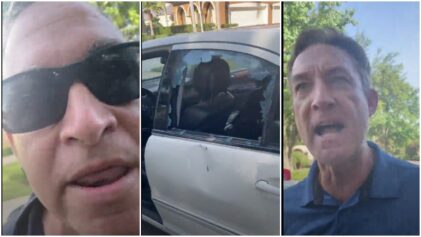George Zimmerman has begun selling his own autograph in an effort to raise more money, but says it’s the lawyers representing the family of the slain Trayvon Martin who are the ones “profiteering” from the case.
In other news involving the case, the judge overseeing the case officially signed off on letting attorneys for Zimmerman acquire Martin’s school records. Martin’s family had pleaded against their release, saying they were irrelevant to the death of their son.
Zimmerman is facing second-degree murder charges after shooting the unarmed African-American teenager during a February 26 altercation in Sanford, Florida, but has insisted he did so out of self-defense. He’s begun sending out autographed thank-you cards to donors in the hopes of raising more money for his dwindling defense fund.
“Thank you for your support,” the card reads, and is signed, “your friend, George Zimmerman.”
In a statement on his website, Zimmerman’s team said he is using the cards to thank those who supported him, not just financially but with “kind words and prayers.”
“George Zimmerman is innocent and should never have been charged, and there is nothing inappropriate about raising money to fund the defense of an innocent man,” the statement said.
It concluded with a blast at the lawyers for Martin’s family.
“If profiteering is a concern, that analysis should begin with those who crafted the misinformation blitz and racially-charged rhetoric, shouted with reckless disregard for the truth, the result of which has been significant financial gain, not ruin,” the statement said. “We speak not of the Martin family, who have suffered the tragedy of losing a son; we speak of the family’s handlers and attorneys.”
A spokesman for the family’s lawyers could not be immediately reached for comment.
A large market exists for the signatures of people involved in a high-profile trials. The signatures of notorious criminals like Charles Manson and John Wayne Gacy can be valuable, Greg Albach of SignHereAutographs told ABC News.
The signed thank you notes from Zimmerman, who has not been convicted of any crime and insists he is innocent, won’t rise to that level, he said.
“It’s pretty tacky,” Albach said. “You could probably get maybe 10 to 25 bucks for it.”
Zimmerman has raised more than $200,000 from those who believe he was justified in shooting the teenager during what Zimmerman claims was a struggle for his gun, with $140,000 of that transferred to the independently-managed George Zimmerman Defense Fund.
Records revealed that Zimmerman burned through nearly $36,000 of the initial donations in 18 days on personal credit cards and telecommunications contracts.
Zimmerman previously had his bond revoked and was ordered back to jail for 30 days after misleading authorities about the amount of money he had raised.
According to GZDefenseFund.com, the current balance has slipped below $15,000 and additional donations are being solicited.
Any funds raised will be used to “support George’s living expenses and legal costs” and will be overseen by a manager of Zimmerman’s choosing, his website states.
Zimmerman has pleaded not guilty to the murder charges, arguing he shot Martin in self-defense and that his actions were justified under Florida’s controversial “Stand Your Ground” law. He is currently living in hiding with his wife Shellie, 25, in Seminole County. A trial is set to begin on June 10.
Martin, who was visiting from Miami, was walking home to the house of his father’s friend with a soft drink and sweets he bought at a local shop when the fatal confrontation occurred. Zimmerman has claimed Martin attacked him first and broke his nose, even though Zimmerman pursued the boy after being told by a police dispatcher to desist.
A decision by the Sanford police department to release Zimmerman without charge on the night of the shooting caused outrage and prompted numerous rallies and marches until the special prosecutor appointed by Governor Rick Scott announced the murder charge in April.
The case has put the state’s “Stand Your Ground” law under scrutiny. Florida is among 24 states to have various forms of “Stand Your Ground” laws on the books that deem a person justified in the use of deadly force without having to retreat if feeling threatened. In Florida, once self-defense is invoked, the burden is on the prosecution to disprove the claim.


